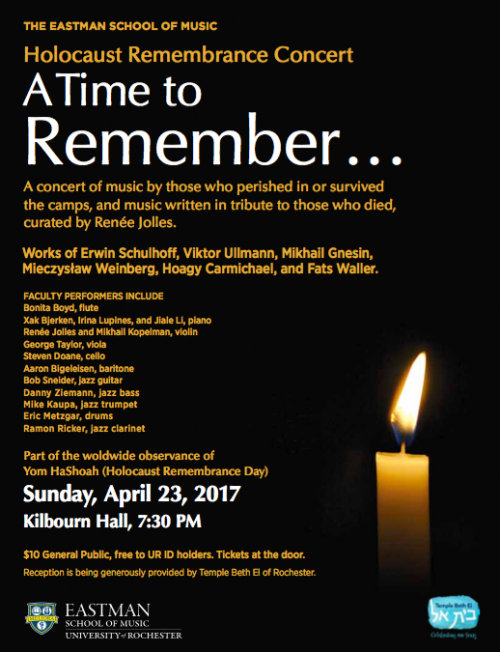By Erik Elmgren
Each year, Eastman hosts a Holocaust Remembrance Concert in the last few weeks of the semester. This concert, started by Eastman violin professor Renée Jolles, celebrates the music of composers imprisoned and in some cases murdered in the concentration camps during World War II. This year, the Holocaust Remembrance Concert will be on Sunday, April 23 at 7:30 p.m. in Kilbourn Hall. In order to get a bit more information about this concert and its unique premise, I talked to Professor Jolles.
What gave you the idea to start this concert series at Eastman?
I was new to Eastman in 2013 and was looking for a way to give back to the community. Originally, I thought of a faculty chamber music series, but saw quickly that there are two major series already in place-Eastman Virtuosi and Morning Chamber Music, plus several more such series in the larger community. The Holocaust Remembrance Concert seemed to fill a niche not yet explored at Eastman, as well as a way to honor my father, a Holocaust survivor who was dying of pancreatic cancer, and the many members of his extended family who had perished in the concentration camps. The first concert included a piece written by my father for Israeli clarinetist Giora Feidman and my mother, harpist Susan Jolles, called Prayer for Peace. The concert takes place each year during the week of Yom HaShoah, Holocaust Remembrance Day.
How do you navigate the process of finding music and programming it when much of it can have sensitive material or be about a painful subject?
Some of the composers were known to me through my work with the new music group, Continuum, but many I am just learning about each year as I delve deeper into stories, books, and music catalogues. Much of the music is only recently published or is still continuing to be discovered, edited, and published. There are several new publishing companies dedicated to publicizing the many fantastic composers who were murdered or whose careers were ruined by the Holocaust. I also very much enjoy it when people send me information about unknown composers. Although this is a sensitive subject, the concerts have had a message of hope, honoring the human spirit to create and to survive.
What makes this year’s program unique from years past?
This year’s program includes two better-known composers, Erwin Schulhoff and Viktor Ullmann, who were murdered by the Nazis, as well as two composers who were fairly well known in the Soviet Union but are relatively unknown to us, Mieczyslaw Weinberg and Mikhail Gnesin. The concert will conclude with a jazz set meant to revive the spirit of two jazz groups, The Ghetto Swingers and The Fritz Weiss Quintet, famous in Theresienstadt (Terezin), who played for concentration camp inmates and their guards. They also were featured in the propaganda movie made by the Nazis to hide their atrocities, The Fuhrer Gives The Jews A City. We know about these performers from survivor accounts including the autobiography of Coco Schumann, a jazz guitarist who survived Theresienstadt and Auschwitz.
Holocaust Remembrance Concert
Sunday, April 23, 2017 – 7:30 p.m.
Kilbourn Hall

